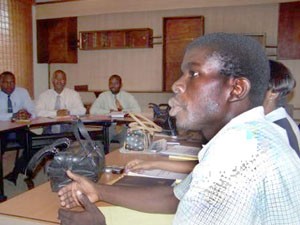
While working towards his degree in finance from Haiti’s Quisqueya University, Makendy Pierre participated in a USAID-sponsored internship in microfinance. Since his internship and graduation, he has become the director of a branch of Fonkoze, one of the country’s largest and most innovative microfinance institutions, in the rural, mountain town of Trouin.
For more than a decade, USAID has invested in the Haitian microfinance sector, each year relying more on local expertise and placing increased emphasis on reinforcing and building local capacity. Through an internship program, USAID aims to build the next generation of local service providers to Haiti’s microfinance and small and medium enterprise sectors.
Investing in this new cadre of local professionals is important in Haiti, where many professionals have left to reside and work abroad. Also, the microfinance sector here is expanding significantly to serve new populations and markets in increasingly innovative ways.
Through the internship, students are paired with host organizations (such as microfinance institutions, associations, savings and credit cooperatives, or other USAID projects) to accomplish tasks that will be equally enriching to the interns and the host organizations. The program has already placed 72 interns in various short-term assignments on topics that have included credit management, market research, information technology, geographic information systems mapping, poverty assessment, and youth entrepreneur coaching.
Two education programs have become reliable sources of intern candidates. One program features returning Haitian students with outstanding leadership skills who were sponsored to attend American colleges for two years, while the second program offers merit-based university scholarships targeting youth from severely disadvantaged backgrounds.
These young professionals bring tremendous energy and talent to their work. While full-time job placement is not formally a part of the internship, some host organizations have been so happy with their interns that they have hired them full time.







Comment
Make a general inquiry or suggest an improvement.